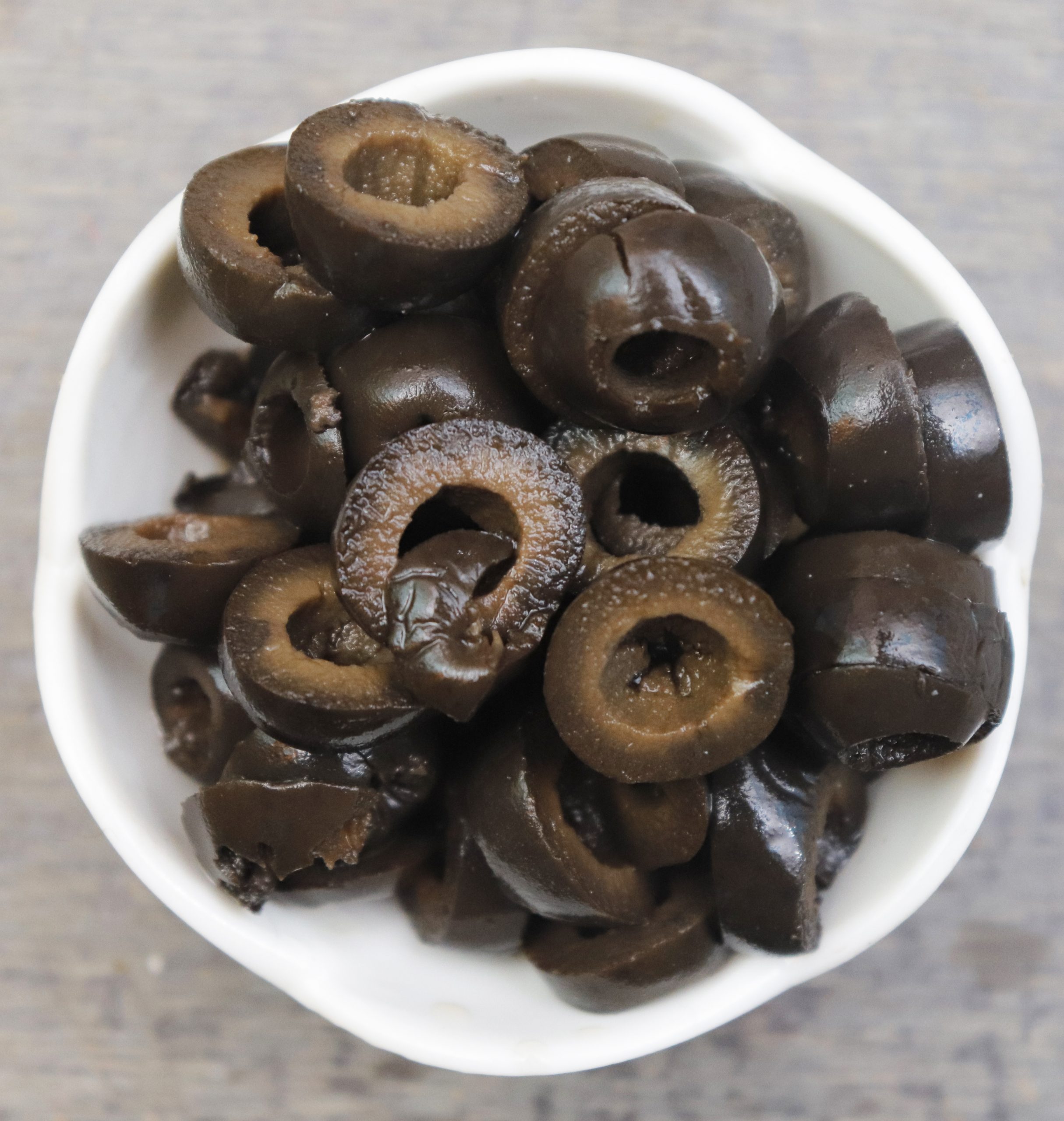-- You can freeze canned olives but it's important to consider the type of olives and their marination before freezing. -- Marinated olives in vinegar may not freeze as well as those in oil or sauce due to texture changes, but they can still be frozen if desired. -- You can freeze canned olives for up to 3- 6 months. -- Thaw frozen olives in refrigerator. -- After thawing, it's recommended to consume the canned olives within 2-3 days.

Are you a fan of olives and love to store them in your pantry? If yes, then you might come across a situation where you need to freeze them. But, can you freeze canned olives?
I understand the challenges of managing pantry items and making the most of your groceries. One item that often accumulates in my pantry is canned olives. My son has a particular fondness for black olives. Every time I go grocery shopping, I can’t resist grabbing a few cans of canned olives.
But, with each grocery trip, the number of cans in my pantry keeps growing. This led me to wonder if I could freeze canned olives, specifically those packed in olive oil, to extend their shelf life and reduce food waste.
Whether it’s the classic black olives, marinated olives, or the tangy Kalamata olives, freezing them can change their texture and taste. However, if you freeze them correctly, you can still enjoy them after thawing.
There are various factors that you need to consider before freezing canned olives. For instance, can you freeze canned olives in olive oil? Or, can you freeze canned olives in oil and sauce? How long can you freeze canned olives before they go bad? This article will answer all these questions and guide you on how to freeze store-bought olives to preserve their flavor and texture. So let’s dive in!
Can You Freeze Canned Olives?

Do you have too many cans in your pantry to consume before the expiration date? And you are thinking can you freeze canned olives? Yes, you can freeze canned olives, but there are a few things to keep in mind.
Canned black olives, marinated olives, and kalamata olives can all be frozen. However, if the olives are in a sauce, it’s best to transfer them to a freezer-safe container before freezing them. If the canned olives are in olive oil or any other type of oil, they can also be frozen.
When you freeze olives it will change the texture of the olives, and once you defrost them they may become softer. It’s best to consume them within six months of freezing.
Whether you have store-bought olives or kalamata olives, freezing can help prolong their shelf life and prevent food waste. So next time you find yourself with more canned olives than you know what to do with, consider freezing them for later use.
Can You Freeze Marinated Olives?
You can freeze marinated olives, but, there may be some changes in flavor and texture. It’s best to avoid freezing marinated olives that contain cheese or other dairy products, as these can separate and become grainy on thawing.
A. Freezing Marinated Olives in Vinegar
Marinated olives in vinegar are the most common canned olives available in grocery stores and are bought frequently.
These olives add a burst of tangy flavor to any dish like salads, pizza, or snacks, or you can incorporate them into various recipes.
Vinegar gives a tangy flavor to olives and acts as a natural preservative, that extends the shelf life of the olives by inhibiting the growth of bacteria.
1. Freezing process and considerations
When you want to freeze marinated olives in vinegar, it’s important to follow the proper process to maintain their quality. Here’s a step-by-step guide:
- Drain the vinegar from the olives.
- Transfer the olives to an airtight container or freezer bag.
- Make sure to remove as much air as possible from the container or bag to prevent freezer burn.
- Seal the container or bag tightly.
Considerations:
- I like to freeze marinated olives in smaller portions because it is easy to thaw and prevent wastage.
- Always label the container or bag with the date of freezing for reference.
- Freezing will slightly affect the texture of olives, so be ready for that.
2. Texture and taste after defrosting
After thawing marinated olives in vinegar, you may notice some changes in their texture and taste. The freezing process can cause the olives to become slightly softer or more watery compared to their fresh state. The flavor may be slightly milder.
But, they still retain their overall taste profile and you can enjoy them.
It’s recommended to use defrosted marinated olives within a reasonable timeframe.
B. Freezing Marinated Olives in Oil
Marinated olives in oil have a different flavor profile compared to those soaked in vinegar. Different types of oils can be used to marinate olives, each having its unique taste and flavor.
The most common oil used for marinating olives is extra virgin. It adds a rich, fruity, and slightly peppery flavor to the olives. It also enhances their natural characteristics and complements their taste.
Other commonly used oils to marinate olives are sunflower, canola, and grapeseed oil. In contrast to vinegar-based marinades, which give a tangy and acidic taste, oil-based marinades offer a smoother and more mellow flavor.
Can you freeze canned olives in oil?
Yes, you can freeze canned olives in oil. I think olives in oil are best to freeze because they generally retain their flavors well after defrosting. The oil acts as a protective barrier, helping to preserve the taste and aroma of the olives.
1- Freezing process and considerations
To freeze olives marinated in oil don’t drain the oil. Make sure that the olives are fully submerged in the oil marinade before freezing. Because it will help protect them from freezer burn and maintain their texture and flavor.
Now put them in airtight containers or freezer bags to prevent any air exposure.
2- Texture and taste after defrosting
After defrosting marinated olives in oil, you may notice some changes in their texture and appearance. The olive oil may solidify or become cloudy when frozen, but this is normal and doesn’t affect the taste or quality of the olives.
After the olives have come to room temperature, the oil will return to its liquid state. But, the texture of the olives may become slightly softer or more tender after freezing, as the freezing process can impact their structure.
In terms of taste, marinated olives in oil generally retain their flavors well after defrosting. But always consume the defrosted olives within a reasonable timeframe to enjoy them at their best.
C. Freezing Marinated Olives in the Sauce
A common question Can you freeze olives in a sauce?
Yes, you can also freeze marinated olives in sauce and preserve their unique taste and enjoy them at a later time.
1- Freezing process and considerations
-
- Drain excess sauce: If the olives are swimming in an excessive amount of sauce, it’s best to drain some of it before freezing. This way yo can prevent the container from overflowing and allows for proper expansion during freezing.
- Transfer to a freezer-safe container: Choose a container or freezer bags that are suitable for freezing. Ensure the container has a tight seal to prevent air and moisture from affecting the olives’ quality.
- Leave space for expansion: Similar to other freezing methods, leave some headspace in the container to accommodate the expansion that occurs during freezing.
- Label and date: Clearly label the container with the date of freezing. This helps you keep track of the storage time and maintain freshness.
-
Texture and taste after defrosting
As all the other frozen olives freezing may change the texture of olives, especially in the sauce. When you thaw frozen olives in sauce, they can become softer and slightly less firm. The freezing process will also affect the texture of the sauce as well, causing it to become slightly separated or thicker. However, marinated olives in sauce typically retain their flavors well after freezing.
How Long Can You Freeze Canned Olives?
While canned olives are known for their long shelf life at room temperature, freezing them can further preserve their quality. You can freeze canned olives for up to 3- 6 months.
After thawing, it’s recommended to consume the canned olives within 2-3 days. Because once thawed, the olives may become softer in texture and their flavors may slightly change. Don’t leave them at room temperature. Store the thawed olives in a sealed container in the refrigerator to prevent any bacterial growth.
Conclusion: Can you freeze store bought olives
Freezing canned olives can be a convenient way to extend their shelf life and enjoy them over a longer period of time. Here are the key points to remember:
- Canned olives can be frozen, but it’s important to consider the type of olives and their marination before freezing.
- Marinated olives in vinegar may not freeze as well as those in oil or sauce due to texture changes, but they can still be frozen if desired.
- Marinated olives in oil are better suited for freezing, as the oil helps preserve their flavor and texture.
- Marinated olives in sauce can also be frozen, but the texture and taste may be slightly altered after thawing.
When freezing canned olives, ensure proper packaging to prevent freezer burn and maintain quality. Label the containers with the freezing date for easy reference. Thaw the olives in the refrigerator before consuming, and use them within 2-3 days after thawing.
FAQS
Can I freeze Kalamata olives?
Yes, Kalamata olives can be frozen. However, like black olives, they may not have the same texture and flavor once they are thawed. It’s best to use frozen Kalamata olives in cooked dishes, such as sauces, soups, and stews.
Kalamata olives, are usually served in a brine or vinegar-based sauce, can also be frozen.
It’s important to note that the brine or sauce may thicken or cloud slightly once the olives have been frozen and then thawed.
To freeze Kalamata olives in a sauce, follow these steps:
– Ensure that the olives are fully submerged in the sauce, and that the lid on the jar is tightly sealed.
– Place the jar in the freezer with the label facing outward to ensure easy identification.
– Keep the jar of frozen olives in the freezer for up to 3 months. After this time, the texture and quality of the olives may begin to deteriorate.
– To thaw the olives and sauce, simply place the jar in the refrigerator overnight. Once thawed, the olives can be consumed directly from the jar, or added to your favorite recipes.
With these simple tips, you can easily freeze olives in a sauce and ensure that they retain their flavor, texture, and overall quality.
Can You Freeze Canned Black Olives?
Yes! Black olives can be frozen, but they may not retain their original texture and flavor once they are thawed. It’s best to use frozen black olives in cooked dishes, such as sauces, soups, and stews.
